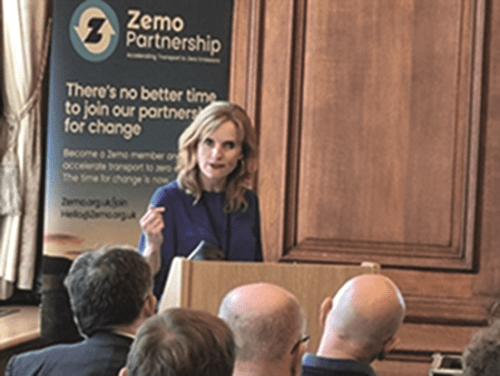
A new Council for Net Zero Transport, convened by the Zemo Partnership and comprising senior stakeholders, is aiming to help steer UK transport’s decarbonisation transition as it moves into what it says is a crucial delivery phase.
The Council will be chaired by Lord Deben, formerly UK Environment Secretary and Chair of the Climate Change Committee. It will engage senior figures from government, industry, environment and academic sectors to help focus the Partnership as it seeks to to forge a clear, strategic direction for road transport decarbonisation.
Lord Deben said: “Our generation faces no greater challenge than that of tackling climate change. With transport responsible for over a quarter of the UK’s greenhouse gas emissions, if we’re going to solve this problem we have to effectively decarbonise transport. We must do this for our environment, and we will reap rewards both politically and economically from doing so.”
Zemo’s new Executive Director Claire Haigh said: “Decarbonising transport is a vital – and particularly challenging – element of the UK’s legally binding net zero targets. The policy prescriptions needed to do this are complex, nuanced and cross-sectoral, and achieving a successful outcome will be of huge benefit to the UK’s environment, society and economy. This is too vital a task for us to be distracted by over-simplifications and the short-term vagaries of our political system.
“We have some world-leading targets but we’re at a key moment in the transition and what we need now is a laser-like focus on delivery. To achieve this, we’ll need the full participation of government (nationally and locally – to the level of each town and parish council) industry, consumers and operators.”
More to do
Claire added that although much has been already achieved, there still much more to do: “Our world is changing fast,” she said. “We are already experiencing the impacts of climate change. Extreme weather events are now a regular occurrence. Migration patterns will only rise as more parts of the world become uninhabitable.
“At the same time, we are living through a period of heightened geopolitical tension. Conflicts in Ukraine and the Middle East are having a direct impact in the form of rising energy bills, higher prices and growing business anxiety about the security of supply chains.
“Our dependence on fossil fuels exacerbates the existential threat of climate change and exposes us to ever increasing risks.
“The UK has a strong track record. But having been trailblazers we are now being outpaced by our international competitors. A race is on to win the new green industries. We must move fast to seize opportunities. An ambitious industrial strategy would act as a catalyst for new technologies and innovation and bring jobs and manufacturing to the UK.”
Speaking about the bus industry, she said: “We need to scale-up zero emissions buses, whilst ensuring that we protect our vital bus networks. We urgently need solutions for freight, but importantly policy must be designed to ensure that SMEs are not penalised. Crucially, the carbon impact from transport is the sum of all the vehicles on the road. We must maximise the potential of low carbon renewable fuels. In the short to medium-term, as a new Zemo report explains, very significant greenhouse gas emissions savings can be achieved by fleets using renewable fuels like biodiesel and HVO.
“We cannot plan for net zero transport emissions in isolation from wider policy areas. We must consider air pollution, the implications of roads policy, whole vehicle life cycle emissions. To quote Lord Stern, climate change is ‘the biggest market failure the world has ever seen.’ At the root of this is a failure to price properly for carbon.
“We need to think more holistically about how we maximise the efficiency of our transport system. We need a cross-party agreement to look at new ways of paying for road use that replace lost fuel duty as the fleet electrifies. Unless we address the cost structures, we are baking in rising traffic growth and congestion at the cost of more beneficial alternatives.
“In this crucial delivery phase, it is local decision makers who will make many of the key infrastructure decisions. Greater progress on net zero can often be made, at least in the short term, through place-based solutions. It is easier at a regional level to break down government silos and develop integrated strategies for transport, housing, skills and economic development. We must ensure that local leaders are able to plan and invest for net zero on an integrated long-term basis.”
Looking towards the future, she added: “The easy wins have happened. The hard yards are yet to come. More than eight out of 10 people in the UK are concerned about climate change but are unsure what they should do. We need an informed national public debate on net zero. The risk is that party-politicking focused on short-term electoral gains will undermine public support.”

